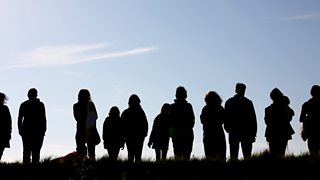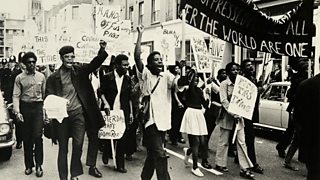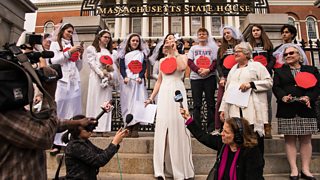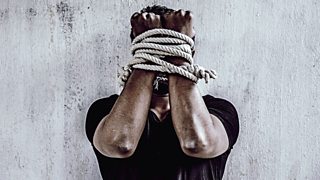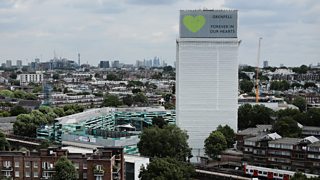The Hidden Story of British Slavery
British slavery might sound like a problem that belongs to a different era but the reality is starkly different. One charity believes there are more than 100,000 victims of slavery in the UK - that’s people who are being exploited and coerced to do something against their will. What’s more, that figure includes thousands of British citizens.
-
![]()
Listen to the Hidden Story of British Slavery
Sangita Myska investigates the secret story of Britons held as slaves.

What is modern slavery?

Modern slavery is a relatively recent term that first hit the UK headlines in 2004 when 23 Chinese nationals, trafficked into the country, were forced by their slavemasters to pick cockles in Morecombe Bay in Lancashire. On an icy February night the tide turned on them and all but one drowned. While alive, they were being paid just £10 per day, which means modern slavery is trafficking and exploiting people for the financial benefit of someone else.
Who is a modern slave?
According to new legislation in 2015 - pushed through by the then Home Secretary, Theresa May - a modern slave includes anyone forced to perform compulsory labour, traffic drugs or use their body for the purposes of sexual exploitation. This was a broader definition of who is a slave and what constitutes enslaving someone, setting standards globally.
How many modern slaves are there in Britain?
In 2013, the Home Office estimated there were 10,000 to 13,000 victims in the UK. Last year, the Global Slavery Index put that estimate nearer to 136,000.
That’s tricky to answer because the cornerstone of slavery is secrecy. In 2013, the Home Office estimated there were 10,000 to 13,000 victims in the UK. Then, last year, the charity Global Slavery Index put that estimate nearer to 136,000.
How many British citizens are among the victims?
Again, exact figures are hard to come by. The only concrete numbers are those from the National Referral Mechanism (NRM) which is where police officers, border force staff and local authority staff will refer a potential victim of modern slavery to the Home Office to ensure they receive the appropriate protection and support. Last year 6,993 people were referred; 1,600 were UK nationals, which is about 23 per cent, meaning that nearly a quarter of victims referred into the National Referral Mechanism are British.

'How anybody could let a human being live like that, I just do not know'
Sangita Myska investigates the secret story of Britons held as slaves.
Who is particularly at risk of being enslaved?
Being vulnerable isn鈥檛 something victims are born with; it can happen to anyone at any time.
In a word, anyone. Emilie Martin is operations manager for the Salvation Army’s anti-trafficking modern slavery unit, which has the government contract to support all adult survivors of slavery. She says being vulnerable isn’t something victims are born with; it can happen to anyone at any time. She’s worked with some people who are very educated including chemists and lawyers. The uniting factor is each victim will be someone struggling with stresses and vulnerabilities, from substance misuse and poverty to divorce or bereavement. Traffickers will befriend that person and target those vulnerabilities, making the victim feel they are being helped. Once the person has been sufficiently groomed they will be trapped into providing services for the traffickers until they are rescued.
Are modern slaves getting the help they need?
That’s debatable. Kevin Hyland was the UK’s first independent anti-slavery commissioner. He quit after claiming he was subject to political interference - a claim strongly denied by the Home Office. Hyland worries the NRM isn’t working properly because he has seen cases where the police say someone is a slavery victim but the decision-makers in the NRM don’t believe them. And remember: victims need to be identified by the NRM to get help such as housing and mental health support. Hyland thinks decisions should be made by a multi-agency panel, comprising police, local authorities, plus experts on childcare, housing and immigration for the relevant cases.
Is anything being done about these allegations?
Hopefully. Sara Thornton is the current independent anti-slavery commissioner and she says the Home Office has embarked on a series of reforms that are being implemented now to address concerns about the NRM’s failings.
Are slave-masters being convicted?
Rarely. Home Office figures suggest there are 13,000 or more victims in the UK every year, yet only 100 or 200 convictions. And although life sentences can be imposed on traffickers under the Modern Slavery Act, that isn’t happening. As Hyland puts it: 98 per cent of traffickers are getting away with it. “It’s terrible.”
More from Radio 4
-
![]()
The British Black Panthers
The untold story of the years when Black Power came to Britain.
-
![]()
America's Child Brides
The tense argument on child marriage in the USA.
-
![]()
Finding Freedom - The Fight Against Modern Slavery
Are victims of modern slavery and trafficking being let down? File on 4 investigates.
-
![]()
Flat 113 at Grenfell Tower
What went wrong in flat 113 at Grenfell Tower? Katie Razzall pieces together the evidence.
